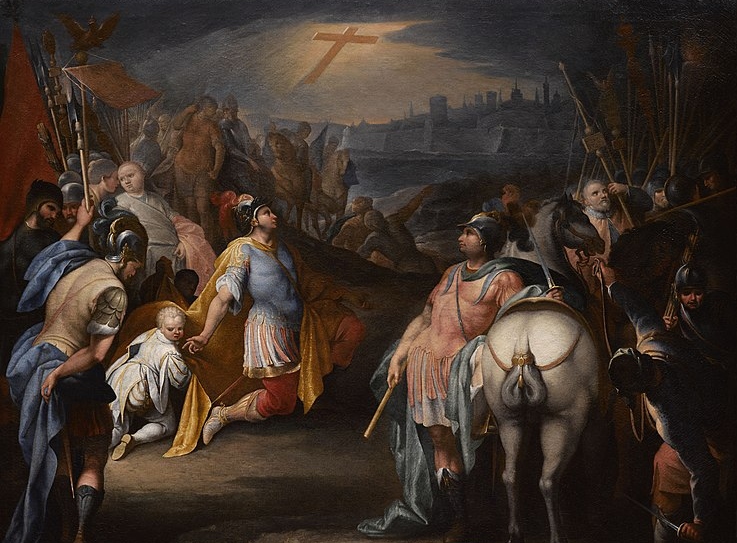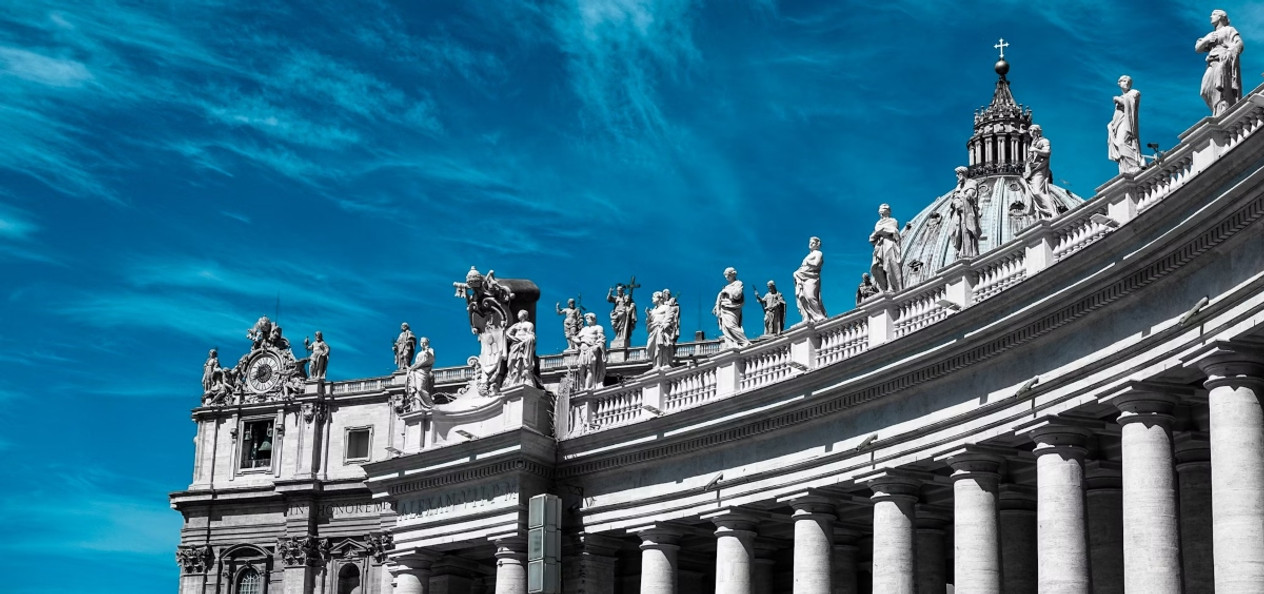RCIA - What to Know & Why It Should Inspire Us
Mar 13, 2024 by Cheryl Hadley
Every year during the Easter Vigil Mass, the Church welcomes thousands of new Catholics into the fold. She celebrates the Rite of Christian Initiation of Adults (RCIA) on Holy Saturday to seal these brothers and sisters in Christ with the sign of our Faith.
What is the history of RCIA, and what should Catholics know about it to strengthen our own faith and desire to serve the Church?
Here are some interesting facts about RCIA and some of our favorite gift suggestions for this special sacramental occasion.
A Rich & Ancient History
RCIA candidates become members of the Catholic Church through a formal process modeled after the ancient practices that prepared the first Christians to receive Christ.
In the early Church, Christian communities took interested parties into their company to guide and protect them. The threat of persecution was real, and necessitated a strong faith in the face of possible martyrdom.
By about 100 AD, specific requirements and a more formalized process took shape. The conversion of the Gentiles meant more converts to the Faith and called for a much more comprehensive level of formation in the Judeo-Christian traditions.

Constantine, son of St. Helena, became the Roman Emperor in 306 AD. In 313, he enacted the Edict of Milan, by which Christianity was officially recognized and tolerated in the Empire. Constantine refurbished Roman temples into church buildings for public worship, restored to Christians their land and wealth seized during persecution, exempted clergy from taxes and civil responsibilities so they could lead the Church, and convened and presided at the Councils of Arles and Nicaea.
He demonstrated deep personal commitment to Christianity, proclaiming that God had helped him rise to victory in battle after a vision. This led to growth in the early Church as more candidates presented themselves for initiation. Local communities began their own formation programs to support the increasing number of inquirers.
By 400 AD and for centuries after, various catechumenal programs sprang up around the world. In the West, Baptism was separated from First Communion and Confirmation. The practice of infant baptism began sometime around the 3rd century AD.
Over 1500 years later, the Second Vatican Council called for reinstating a Catechumenate for the worldwide Church. The Rites were written, distributed, and implemented over time, from around 1966-1988.
[[5258,23898]]
[[17732,3624]]
The RCIA Process for the Unbaptized
The RCIA program helps interested parties discern, learn, and commit to life in Christ by embracing Catholicism.
Through RCIA, non-baptized men and women enter the Church after a period of formation and discernment that happens in stages. The stages involve study, prayer, and rites during Holy Mass. This period of formation gives candidates, also known as catechumens, the time and knowledge they need to discern.
As they learn about our Faith and study the Gospels, catechumens undergo a conversion, profess their faith in Christ and the Church, and eventually receive the sacraments of Baptism, Holy Communion, and Confirmation.
[[18487,11180]]
Step by Step
There are several stages to RCIA for the unbaptized:
Period of Evangelization or Precatechumenate
During this time, an individual feels called to Christ and drawn into a relationship with Him. This relationship leads the inquirer to an interest in the Catholic Church.
This may be the culmination of a long process of searching over many years, involving many different paths and attempts to find God. Sometimes it happens more quickly, as when candidates have close friends, spouses, or other family members who encourage them to discern the Catholic Faith.
If an inquirer wishes to begin the process of formal discernment to enter the Church, they formally seek acceptance into the Order of Catechumens. This happens during the Mass, when the parish community affirms its support of the candidate's desire.
[[712,34328]]
[[51003,15458]]
Period of the Catechumenate
Technically, there is no set time for this period, but generally, parishes have structured formation programs with weekly lessons for two semesters. Still, the journey is an individual one. Each person grows in his or her own faith at a different rate and has different challenges, questions, and concerns along the way.
During this period, the catechumen is not only discerning, learning, and growing in the Scriptures and coming to know God, but also considering what changes he may need to make in order to respond fully to the inspiration of God and to embrace a Catholic life in union with Him and the Church.
[[12114,50505]]
Once the priest, parish formation team, and the catechumen himself believe that he is ready to commit his life to Christ and the Church, he requests Baptism and the celebration of the Rite of Election. In this beautiful rite, the catechumens are "enrolled."
As a group, with their sponsors and formators, they express their desire for Baptism at the coming Easter Vigil. This enrollment is generally received by their diocesan bishop as their names are formally recorded in a special book known as the Book of the Elect.
The Rite of Election generally takes place on the first Sunday of Lent, when the Book of the Elect is presented to the bishop. The catechumens are now known as "the Elect."
[[50821,14396]]
Period of Purification & Enlightenment
The Elect approach the season of Lent with intensity of purpose, prayer, continued studies, and spiritual direction. This is the time immediately preceding their entrance into the Church. The parish community is encouraged to pray for the Elect during this important period.
The Celebration of the Sacraments of Initiation is the climax of the process. At the Easter Vigil on Holy Saturday, the Elect receive the sacraments of Baptism, Holy Communion, and Confirmation, and they are fully initiated into the Catholic Church.
[[53116,53114]]
Period of Post-Baptismal Catechesis, also called Mystagogy
This final stage of RCIA lasts until Pentecost. During this period, newly-baptized Catholics continue to read and reflect on the Scriptures, Sacraments, Church teachings, and their experiences in Christ. They also discern how they will serve the Church in her mission.
The Mass and sacraments they received at the Easter Vigil are the source of rich catechesis and reflection during the mystagogy as their program concludes.
[[12927,52623]]
[[51201,43684]]
For Those Who Have Already Been Baptized
Those who have already been baptized into another Christian denomination undergo a different process known as "Coming into Full Communion" with the Catholic Church. These individuals have been baptized and catechized in the past and have lived a Christian life within a denomination other than Catholicism.
They do make a profession of faith, but most are not baptized again, assuming their first baptism was valid. They are known as Candidates, not Catechumens, and their preparation is centered around understanding and living the teachings and practices of our Catholic Faith.
Some of their preparation may take place with the Catechumens, but the process is different because they have already professed faith in Christ, been committed to Him, and received Baptism. They may have participated as active members of other Christian communities and already embraced a life devoted to Christ.
The Candidates can be received into the Church during the Easter Vigil or at another Sunday Mass during the liturgical year, depending on their individual readiness and pastoral circumstances.
[[23681,6759]]
Celebrating the Sacraments of Initiation
The Easter Vigil is celebrated after nightfall on Holy Saturday. At the beginning, the congregation processes outside to a blazing fire in the Service of Light. There the priest blesses the fire and Paschal Candle, which symbolize Christ as the Light of the World.
The Liturgy of the Word begins, and at its conclusion, the Catechumens are presented to the community. Together, they pray the Litany of the Saints on their behalf. Those to be baptized renounce sin, profess their faith, and receive the sacrament of Baptism.
Dressed in white garments, they are presented with a candle lighted from the Paschal Candle. The bishop or priest confirms them and anoints them with sacred chrism. The Mass continues with the Liturgy of the Eucharist, where the newly baptized and confirmed receive their First Holy Communion.
[[13341,3902]]

The Marvel & Meaning of It All
To experience the beauty of the Easter Vigil is to experience the "mother of all vigils," according to the Roman Missal. That is an incredible grace for anyone who loves the richness and meaning of our sacred liturgy.
But to experience it when new Catholics enter the Church is a reawakening - an inspiration for those of us who are already practicing the Faith. It reminds us of who we are and what it means to believe as we witness the modern yet timeless rite.
We are witnessing a proclamation of faith that in ancient times cost courageous Christians their lives. It's easy to forget that in our modern world, martyrs still die every day for what we are privileged to live so freely. It should prompt the beloved Alleluia we left behind during Lent to fill our hearts with joy and gratitude.
This is a rite that reaches back through the centuries and out across the world, joining us with those who gave - or will give - their lives for what we all believe.
Together, we are one body, from the birth of Christianity until the end of time. Together we have chosen to live this truth and beauty, in a world becoming more disordered and confusing by the day.
We are all united, and these new Catholics are a visible reminder of the timelessness of our Faith. Over 2,000 years later, their presence among us and their choice to join us echo the voices of the martyrs and the saints, calling to mind the prophetic words of Christ about His Church:
And I tell you, you are Peter, and on this rock, I will build my church, and the gates of hell shall not prevail against it. - Matthew 16:18
[[16622, 23121]]





